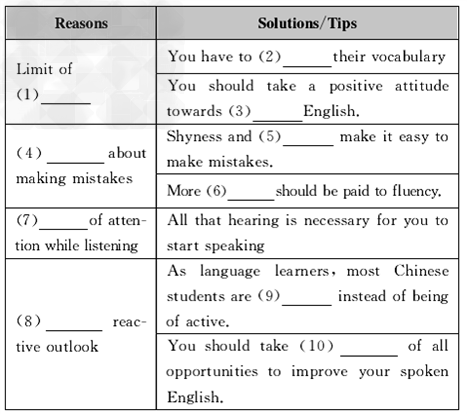阅读理解。
Although many Chinese students say that their knowledge of English grammar is good,most
would admit that their spoken English is poor.Whenever I speak to Chinese students they always
say,"My spoken English is poor."However,their spoken English does not have to remain "poor".
I would like to suggest that there may be some reasons for their problems with spoken English.
First,they fail to find suitable words to express themselves due to a limited vocabulary.
Obviously the better ?answer? is to expand their vocabulary.However,you can speak with a
limited vocabulary,if your attitude is positive.Others will follow you as long as you use the words
that you know.
Second,they are afraid of making mistakes.Sometimes they make mistakes when they are
speaking because they are shy and nervous.Yet students should remember that their goal should
be FLUENTLY NOT ACCURACY.Your aim in writing is to be accurate following therules for
grammar and using the rules to get your message across,to talk to someone in English,as quickly
and well as you can,even though sometimes you may use a wrong word or tense,but it doesn't
matter because the person you are speaking to will understand you and make allowances for any
mistakes he hears.
The third reason is that not enough attention is paid to listening.You have one mouth but two
ears! All that hearing is necessary for you to start speaking.
Fourth,most Chinese students are reactive rather than proactive language learners.Instead of
actively seeking out opportunities to improve their spoken English they passively wait for speaking
opportunities to come to them and wonder why their English always remains poor.If you have
this proactive outlook,then,you will see English opportunities wherever you go.
If you do not use your English beyond the classroom you will forget that English you know.
Remember:USE IT OR LOSE IT! You can learn how to speak English better by speaking
English more.
Title:Problems with spoken English

1.vocabulary 2.expand/enrich 3.speaking 4.Worries 5.nervousness/tense 6.attention 7.Lack/Shortage 8.Having 9.passive 9.passive 10.advantage
